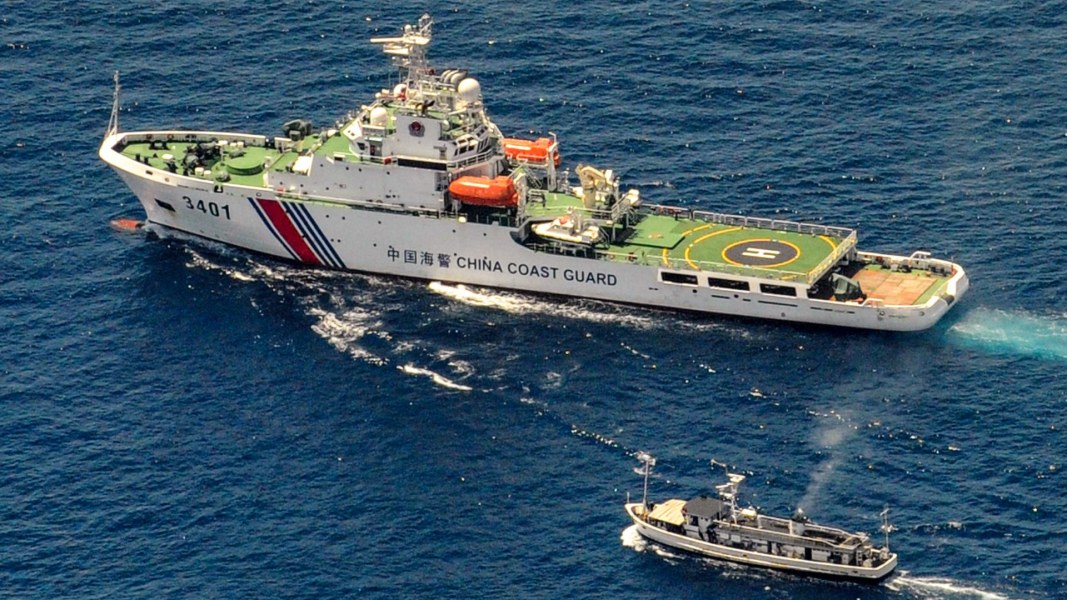China’s Global Times: Are Paper’s Warnings of War With U.S. Legitimate?
by Mark Hanrahan
Is China Militarizing in the South China Sea? 0:36
Donald Trump's administration has yet to take power, but his Cabinet picks are already risking a "large-scale war" with China — at least if one state-run media outlet is to be believed.
During his Senate confirmation hearing Rex Tillerson, Trump's pick for Secretary of State, likened China's activities reclaiming land in disputed regions of the South China Sea to Russia's annexation of Ukraine.

A man looks at a newsstand with a copy of the nationalistic Global Times tabloid displayed on a basket in Beijing, China, on April 5, 2016. Ng Han Guan / AP, file
He added: "We're going to have to send China a clear signal that first, the island-building stops and second, your access to those islands also is not going to be allowed."
The prospect of the U.S. blocking China from accessing the islands it has built in the region drew a predictably furious response from the Global Times, a state-run newspaper and website that frequently publishes nationalistic and bombastic editorials on international affairs.
"Tillerson had better bone up on nuclear power strategies if he wants to force a big nuclear power to withdraw from its own territories," the paper wrote in an
editorial Friday.
It added: "Unless Washington plans to wage a large-scale war in the South China Sea, any other approaches to prevent Chinese access to the islands will be foolish."
The paper's response was notable, both for its attention-grabbing threats, but also for how strongly it differed in tone from Beijing's official response.
Chinese foreign Ministry Spokesperson Lu Kang paraphrased some of Tillerson's other remarks, saying: "China and the U.S. have some differences but also share a lot of common interests and consensus, and we should see the positive dimensions in our relationship rather than let disagreements over other issues exclude areas for productive partnership."

Chinese construction teams work on Johnson South Reef in the disputed Spratly Islands in the South China Sea. Armed Forces Of The Philippines via The New York Times
So how closely do the provocative editorials in the Global Times reflect the thinking inside the ruling party?
"The Global Times as a newspaper has its own way to respond to issues like this," Dr. Xin Xin, a reader at the Communication and Media Research Institute at the U.K.'s University of Westminster told NBC News.
She added: "Though it is part of a party organ — it follows different rules ... In terms of how it formulates the party's view, they have more flexibility. In order to generate readership it does adopt techniques you would be familiar with in Western newspapers."
The paper's editor-in-chief, former army officer and Chinese Communist Party member Hu Xijin, claims the discrepancy can be attributed to his paper publishing what party officials privately think, but don't express publicly.
In an
interview with online news outlet Quartz, Hu said that he regularly spends time with officials from the foreign and security ministries, and that their views aligned with his paper's editorial stance.
Other experts suggest that Global Times' controversial editorials should not be seen as a direct statement of the positions or intentions of the Chinese government, but as communications that reflect, and speak to, certain sections of both China's general population, as well as the ruling party and military.

China's Liaoning aircraft carrier conducts a drill in the South China Sea in December. China Stringer Network / Reuters, file
"Global Times' editorials are used to assuage a nationalist demographic, which is generally young and extremely hawkish, at a time when nationalist passions are inflamed," Dr. Jonathan Sullivan, director of the China Policy Institute at the U.K.'s University of Nottingham told NBC News. "What Tillerson said is effectively calling for a blockade — an action usually interpreted as an act of war. The Chinese government would be inviting trouble from this demographic if it didn't respond."
Experts told NBC News that the Global Times has a "substantial" readership in China and that the paper would not pursue such an extreme editorial line if there was no demand for it.
Estimates suggest that the Chinese-language edition of the paper sells between 1.5 and 2 million copies a day, while its English-language edition sells around 100,000. Its websites reportedly attract around 15 million visitors a day.
The English-language edition of the paper is widely read by foreigners in China and beyond, resulting in its controversial pronouncements generating significant column inches in overseas media compared to other Chinese media outlets.
Some commentators, however, suggest that Western media has an outsized perception of the paper's actual influence.
A
2014 report by a Ph.D. candidate at the University of Western Australia found that only 0.8 percent of over 1,400 respondents in five Chinese cities said they got their information on the South China Sea dispute from the Global Times.
Sullivan predicted that the Global Times will be an increasingly useful tool for China's government in the coming months.
"Beijing is still not sure how to interpret Team Trump, and does not want to respond with actions that could spiral," he said. "It also still holds some hope that Trump's pronouncements are negotiating tactics rather than actual policy. Thus a response within the rhetorical arena is, for now, a useful tactic for China; which is where Global Times serves very well."
















